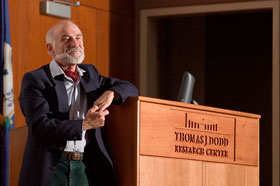  |
| HOME | THIS ISSUE | CALENDAR | GRANTS | BACK ISSUES | < BACK | NEXT > |
Facts of daily life often concealed in written records, historian saysby Cindy Weiss - December 5, 2005 |
||||
|
As a historian, Rhys Isaac faces a dilemma. “Language is a large part of how we make sense of what we experience,” he said, in a lecture during the first James L. and Shirley A. Draper Graduate Student Conference in Early American Studies held at UConn. Yet, as a historian with an anthropological bent, his intent is “to get at forms of knowledge that are not verbalized,” he said. “In some ways, the written record exists to deny,” he added. Isaac, the keynote speaker at the conference, which examined the history of the senses in early America, said that drawing inferences from written records – “reading it backwards,” as he called it – is sometimes the only way to uncover the story of daily life. Rhys, the Pulitzer Prize-winning author of The Transformation of Virginia 1740-1790, lamented “how much the practice of academic history omits.” In his latest book, Landon Carter’s Uneasy Kingdom, he consulted the diary of Carter, a rich planter in early Virginia who supported the American Revolution. But the diary omits any mention of the slaves singing, in its attempt to depict the plantation in the English tradition. “Singing filled Landon’s house and fields. And that’s how we have to remember early America,” Isaac said. “Virginia must have been much more like Kingston (Jamaica) than Leicestershire, and yet it’s not described that way.” Medical entries in the diary provided him with critical access to the workings of daily life, he noted, as Carter described in detail the boy Samson’s illness with ague and fever, and the green bile he brought up during treatments. Carter’s scientific interest in the illness led him to describe bodily functions that were normally concealed in the written record. “You can see what a repressed wielder of the pen he is just by looking at that,” Isaac said, describing a formal portrait of the wigged planter.
“There’s lots of evidence that in the business of repression, our culture has been tops for a long time,” said Isaac, currently a distinguished visiting professor of early American history at the College of William and Mary. That creates a challenge for the historian of early America, when society stigmatizes the senses and filters the record, he noted. His most difficult assignment, on which he is now working, is to figure out how to represent the outdoor, “vernacular community” in early Virginia, which was almost entirely African American and which “had no footing in this society.” Isaac’s keynote talk opened a conference that will be held here again next year and then biennially, rotating with a graduate conference at the McNeill Center for Early American Studies at the University of Pennsylvania. UConn’s conference is organized by graduate students in history and is funded by the Draper Chair in Early American History. “The combination of things that makes this conference distinctive is graduate students defining the theme and issuing the call for papers,” said Robert Gross, the James L. and Shirley A. Draper Professor of Early American History. “They can make a mark on American studies and help shape its intellectual agenda.” Patrick Blythe, a Ph.D. student and co-organizer of the conference, said a student committee worked on the project. “We got a taste of academia,” he said, “besides just reading, writing, and teaching.” |
| ADVANCE HOME UCONN HOME |

